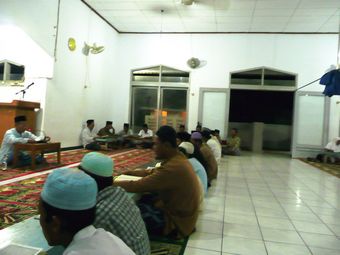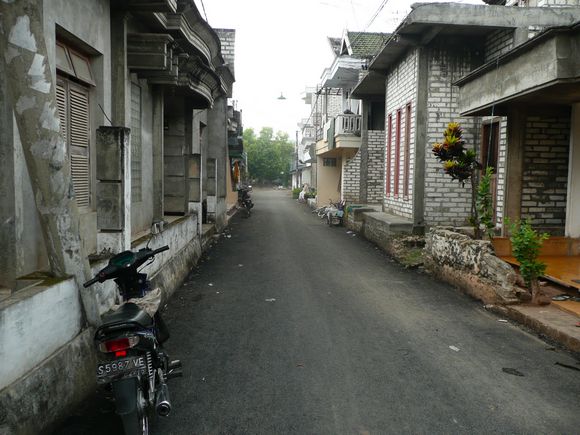Nathan Franklin
A typical street scene in Lamongan, East Java, where FPI finds support from many Muhammadiyah membersNathan Franklin |
1 June 2008 marked the sixty-third anniversary of the Pancasila ideology. On this day members of the National Alliance for the Freedom of Faith and Religion held a rally at the National Monument (popularly known as ‘Monas’) in Jakarta demanding that the controversial Ahmadiyah sect should be dealt with in accordance with Indonesian law rather than subjected to organised violence. Members of the Islamic Defenders’ Front (FPI) descended upon the gathering, harassing and assaulting them. It did not surprise many that the FPI took this action: for years its members have attacked Ahmadiyah mosques, prayer houses, and other properties throughout Indonesia, while calling on the government to disband the organisation.
The incident at the National Monument appeared to swing public opinion against the FPI. What should have been a day of celebration was instead transformed into a violent incident that reverberated throughout the country. For several weeks, the national media were flooded with reports about the incident at Monas. There was a cry from liberal groups and many ordinary Indonesians for the FPI itself to be disbanded. The government responded by arresting the FPI militant wing’s commander, Munarman, and central chief, Habib Risiek Shahib, for initiating the violence.
It is less widely known that the incident also had consequences outside the capital. In the East Java pesantren region of Lamongan, it very nearly caused a conflict between members of Nahdlatul Ulama (NU) and Muhammadiyah.
FPI in Lamongan
The FPI was formally established in Lamongan in July 2005, built upon a local organisation called ‘The Fighters Enjoining Honour and Forbidding Dishonour’. The Lamongan branch is relatively autonomous but nevertheless receives instructions from the FPI Central Leadership Board in Jakarta. A long-standing instruction commands FPI members to pressure the government to disband Ahmadiyah.
The FPI has a strong presence in the subdistricts of Brondong and Paciran, north of Lamongan. Local reports suggest their numbers range from 75 to 100 members. However, according to their leader in Lamongan, the FPI under his command can amass between five hundred and a thousand ‘soldiers of Allah’ when it goes on raids. The Lamongan group relies heavily on young males as foot-soldiers. The older members provide leadership in Qur’anic studies, and in directing physical operations. This is based on the FPI philosophy of ‘amar ma’ruf nahi mungkar’, derived from the Qur’anic verse in Surah Ali Imran (Ayat 104), ‘Let there arise out of you a band of people inviting all that is good, enjoining what is right, and forbidding what is wrong: They are the ones to attain felicity’.
Since this Brondong–Paciran area along the north coast of Lamongan is dominated by Muhammadiyah, the FPI ranks include many Muhammadiyah Muslims. In fact, the deputy leader of the FPI in Lamongan is also the headmaster of the Muhammadiyah pesantren of Karangasem in Paciran. Another Lamongan group whose membership overlaps with the FPI is the North Coast Islamic Youth Association, which was responsible for inviting Abu Bakar Ba’asyir to the area in October 2007 (see Inside Indonesia 92 ). Like the FPI, Ba’asyir encourages a rigid interpretation of ‘amar ma’ruf nahi mungkar’ during his sermons, selectively intertwining it with promotion of holy war and martyrdom. These narrow and literalist interpretations of Islam provide legitimacy for hardline Muslims in the area who wish to resort to physical action to achieve their objectives.
An NU–Muhammadiyah conflict in the making?
Even before the 1 June incident, former Indonesian President Abdurrahman Wahid (Gus Dur) had been an outspoken defender of Ahmadiyah’s rights and a frank critic of the FPI. Gus Dur argued that Ahmadiyah was not a threat to anybody, and that its followers were responsible citizens who deserved the same rights and privileges as other Indonesians. FPI founder Habib Risiek Shihab argued that Gus Dur was wrong and that Allah would judge him so. The situation developed into a heated public debate about tolerance and what methods were acceptable for dealing with such issues.
Police in Lamongan asked local religious leaders to discourage angry NU youth from confronting the FPI
Although there are no known Ahmadiyah members in Lamongan, the local youth wing of NU, known as the Ansor Youth Movement (GP Ansor), who are concentrated in the south of Lamongan, were angered by the way the FPI – and in particular Habib Risiek – treated Gus Dur. In a TV statement broadcast on Indonesia’s Channel One shortly after 1 June, Habib Risiek stated that Gus Dur could not have understood what happened at Monas because he was blind. Furthermore, he claimed that Allah protected the FPI from the former president’s efforts to disband it, and instead disbanded Gus Dur’s government. A local newspaper reported that the GP Ansor were about to come to the north coast of Lamongan from their base in the south to force the FPI to disband. According to a police chief in the area, there was a real concern that the row could develop into an NU–Muhammadiyah conflict, as a large number of Muhammadiyah members were affiliated with the FPI.
Police in Lamongan approached the local religious leaders, including the leaders of the Sunan Drajat School and the Lamongan branch of the Indonesian Council of Islamic Scholars, in the hope that these religious figures could persuade the GP Ansor not to come to the north coast to confront the FPI. This strategy proved successful. The GP Ansor members never arrived. Speaking afterwards, the leader of the Lamongan branch of NU downplayed the situation, saying the GP Ansor had planned to go to the Paciran-Brondong area only to get a clear picture of the FPI’s position in Lamongan. However, many local residents believe that the intervention and consultation initiated by the Lamongan police succeeded in averting a dangerous conflict which could have had serious long-term consequences.
Is the problem over?
 |
FPI members gather to study the QuranNathan Franklin |
According to polling conducted on the official NU website, 57 per cent of respondents maintained that the FPI was necessary to eliminate immorality and oppose liberal groups, while a quarter of respondents believed that the FPI should be disbanded because it ruined the image of Islam.
Both positions are found among the NU community in Lamongan. Some locals think that the FPI were just thugs and the organisation should be disbanded. Others see the FPI as useful for eliminating drinking, gambling and prostitution in the area. Although there were mixed opinions about disbanding FPI, there is considerable consensus among NU followers in Lamongan about Ahmadiyah. Most believe it should be disbanded because of its recognition of a prophet postdating Muhammad. Regardless of affiliation, all Lamongan residents believed that an NU–Muhammadiyah conflict would be detrimental to Islam.
The existence of Ahmadiyah and the FPI will continue into the foreseeable future, as will disagreements between Gus Dur and Habib Risiek. And as this example shows, events on the national stage can resonate in regional contexts and ignite religious conflict. There is reason to hope that the incident in this rural district in East Java has been resolved. But the history of rivalry in Lamongan means religious matters are highly charged and the potential for conflict remains. ii
Nathan Franklin (nathan.franklin@cdu.edu.au) is a doctoral student at the Charles Darwin University, working on pesantren and Political Islam in East Java.
